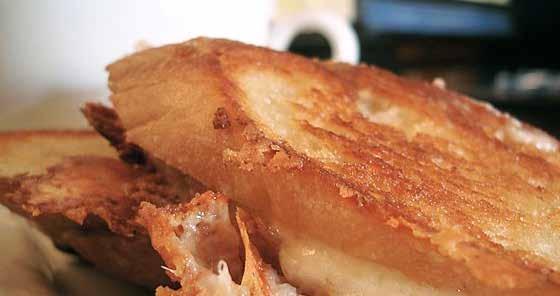Dear Fresher’s Me
The University Times speaks to former Chief Medical Officer Tony Holohan, Author Catherine Prasifka, and Journalist Sally Hayden about the advice they have for incoming Freshers.

The University Times speaks to former Chief Medical Officer Tony Holohan, Author Catherine Prasifka, and Journalist Sally Hayden about the advice they have for incoming Freshers.
Where to shop in Dublin, a Freshers’ Guide to College Nightlife, your guide to the Students Union, and an explainer for those new to Irish politics.
For culchies scandalised that no one wears tracksuits on campus, take a look at our guide to college fashion. page 11»
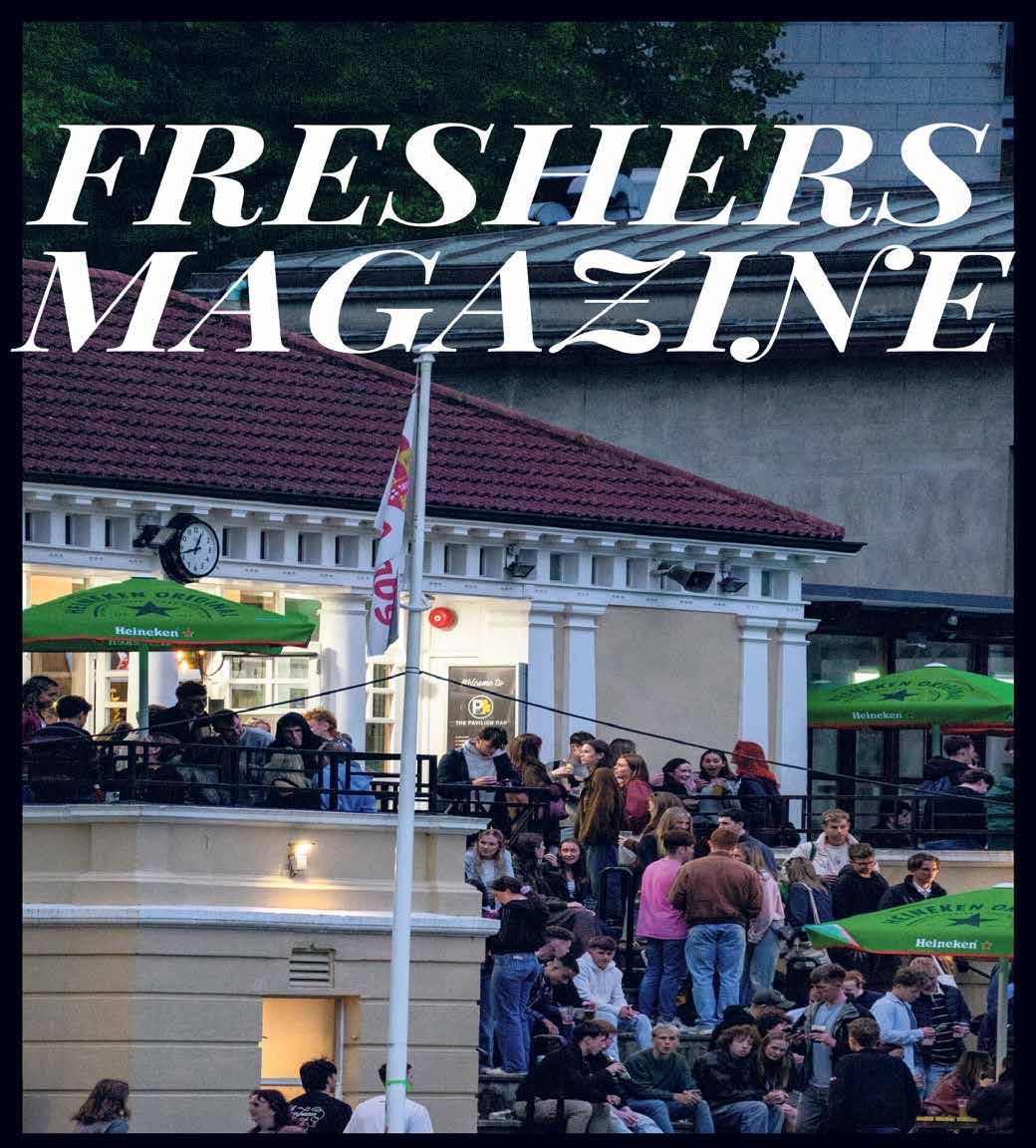
Contributions from Brídín Ní Fhearraigh-Joyce, Eliora Abramson, Eoin Connolly, Amélie McGowan, Fachtna Mac Conghail, and Molly Wetsch
Illustration by Mathilda Gross
Ahhhh, the Trinity Twenty. The list your future employers don’t want to see, the black mark of all black marks, and the price to pay for popularity. This hodgepodge of heroes may be the best Trinity has to offer in terms of a notoriety contest, but make no mistake: they are, for the most part, champions of causes unknown or just general delinquents. After all, this list is as old and irrelevant an institution as Trinity itself. Whether you’re an aspiring Big Name on Campus (BNOC) or have spent your college years as far under the radar as the Lower Lecky, you’ll probably always be a nearly-made-it, and maybe that’s a good thing.

Our wonderwall. Our champagne supernova. Linda Doyle can lay her tired head down much more peacefully on her custom memory foam pillow now that Lazslo has become just another faceless cash cow. Linda, don’t look back in anger. Go forth with joy. When one feud dies another is born from the ashes. Jenny, are you ready for it? If not, at least we’ll always have Paris.
Annika Ramani isn’t all what you’d expect. She certainly is one of those people you meet and can tell were “very active on campus”, but also hasn’t sold her soul on LinkedIn like many others with such a label have. She now sits at the top of the college’s largest, oldest/second oldest student/debate society (depending on who you ask and your thoughts on the ship of Theseus), the Phil. Under her tenure, the Phil will continue to work hard to remain the Philthiest society in the GMB and the most down to earth, since they occupy the rooms at the bottom of the building.
David Wolfe Editor, Trinity News

While we may always cower in fear at the sound of footsteps in the hallway outside the Trinity Pubs office, this staff really does respect David Wolfe’s commitment to proving that social media manager skills CAN translate to an Editor-in-Chief’s authority. Who says micro-influencers don’t have talent? David is certainly moving up in the world, at least the world of this list. Last year he shared his position as BNOC with fellow socialite James Wolfe. This year, we have bestowed the honour of his very own spot. Editor, So Confusing ft Trinity News, when? David, can we work it out on the remix?
When begged for details and gossip regarding their fearless leader, DU Players members declined to comment, simply describing DU Players Chairperson Fiona Murray as a ‘legend’. This newspaper deduces that there must be something afoot. Why Fiona would choose to leave the Cayman Islands for the Emerald Isle is beyond us, and frankly, extremely suspicious, but we have long since given up trying to decode and make sense of the minds of those who willingly participate in a 24 hour musical. With all the vitriol, and yes, okay judgement, these enigmas receive from us normal folk, theatre people must protect each other we guess.
Shall I compare thee to a summer’s day? If your name is Simon Evans, yes shall. Like a mirage in a desert, like the sun peeking from behind a cloud on a rainy day, he is always just a hop and a skip away in Teach a Sé. Has ever a man existed, so wise and generous, so strong and so humble? A constant in an ever changing world, The University Times’ own personal North Star. We would follow him into the dark or at the very least into the Buttery. This endorsement has nothing whatsoever to do with Simon Evans’ role as The University Times sugar daddy.

We have prayed and begged on our hands and knees for him for years, and now our prince of Gaelige is here to save TCDSU from certain ruin. Pádraig Mac Brádriagh is rumoured to have learned Irish in the famous Gaelteacht of Nua Eabhrac in the States, which we are still trying to wrap our heads around. If the Cumannn Gaelach’s mole manages to achieve his manifesto goal of getting the College to make all degrees accessible through Irish, we The University Times will personally perform a weekly jig flash mob in front square just to honour his achievements.
82-year-old Brídín Ní Fhearraigh-Joyce is proof that though the American gubernatorial system may still be in a fierce grapple with ageism, the University Times decidedly is not. After a fierce election season (and only one vote recount!), Ní Fhearraigh-Joyce has only one mission: to ensure that this glorious newspaper will reclaim its former glory at the competition of all competitions, the hallmark of student journalism, our very own Oscars, VMAs, and Grammys combined: the Smedias. The entire college community is waiting with bated breath to see what this newspaper will accomplish now that is once again dictated (sorry, run democratically) by a former English student.

What does the Education officer actually do? We aren’t exactly sure, but we hypothesise it likely involves leaning against Teach a Sé, cigarette in hand. A professional hack who is never far from an entourage of captivated women, Eoghan is very busy. For one, he has to go out almost every night. Second, he is constantly giving Jenny Maguire oral, sorry, we mean moral support. All while hiding that he is secretly a Fine Gael supporter dressed in a well-groomed leftist disguise. We would never be able to walk a mile in his Louboutins!

Your favourite president’s favourite president. Your dream girl’s dream girl. While Jenny Maguire may have sparked torrid romance rumours with bitter rival Ralph Balfe (along with half of Players and half of the SU) last year, this year she’s got her eyes focused on one great love story: running TCDSU like the goddamn Navy - and looking better than any past president (sorry, László) in the process.

For the two hours a day when he is awake, Hamza brings the biggest aura that the Student’s Union has ever seen. Having founded the first ethnic minority support group in Trinity, this guy means business AND naps - who says you can’t do both? A king who is very fond of posting thirst traps, sorry, powerlifting photos online, he is there to offer special professional ‘there there’ pats and purely platonic hugs to any recently dumped students with 2.2 and below results.

The Student Managed Fund may have been dominated by alpha-male crypto bros in the past, but Ashling Bourke is turning over a new leaf at the organisation, serving as the first female CEO of the business school’s finest swindlers since 2017. What she may lack in Andrew Tate subscriptions she certainly makes up for in sheer determination: There is not a single investment out there she can’t analyse the everloving hell out of. Goldman Sachs analysts are trembling in their loafers and quarter-zips.
The origins of Tom Francis are disputed by Hist-orians. Some tell of an infant boy left on the doorstep of the GMB with a scar on his forehead, some claim he is one of Boris Johnson’s indeterminate number of children, but the one scandalous fact that all accounts agree on is that he is English. From supporting Queen’s Park Rangers to his time in the Hist, Tom has long been a fan of underdogs. Tom has been seen in the past walking across tables and delivering long drawn out stories about triangular lakes (ask him at your own risk), but somehow manages to be a positive presence in the GMB, though we still sit back with concern for what antics his tenure will bring.
The gospel according to James (Ryan): and on the 8th day, after God had gotten some sleep and decided to have a little fun, James Ryan was created, a Heineken in each hand, dubbing it “the Leinster handcuffs” for some reason. Proving that Northsiders can be posh too, James was able to reach the aspiration of all parents for their children; studying law at Trinity. Perhaps he is the saviour God predicted, the saviour with one crucial task: make Law Ball worth going to again.

Only a theatre girl could send emails with as much pizzazz as Beth Strahan; we can almost see the jazz hands and box steps. If you’re looking for her office in Teach a Sé all one needs to do is follow the yellow brick road (that’s a good musical reference right?) and the melodious Northern accent. If only she could record her emails as podcasts… deal of the week ads just got a whole lot sexier.
Due to a truly dire lack of BNOCs traipsing campus this year, the staff of this newspaper had no choice but to reluctantly include the two endlessly badgering the Editor and bravely leading the University Times into a new era…one could even call it a Revolutionary War? Americans Molly Wetsch (of Forbes fame) and Eliora Abramson (of former St Andrews fame), the Deputy and Assistant Editors of The University Times, are on the prowl for a hot date AND a hot story, whilst singledhandley proving the theory that American students are only here to find love. Call them. Seriously (they’re spending far too much time in House 6).

“Quiet
Behind every student activist is a beautiful alt girlfriend who is hotter than him. Having been forced to surrender his title, and hence his power, in a desperate bid to remain relevant László Molnárfi has pivoted his efforts to reporting and writing for Trinity News. Why? We have no idea but we can only guess it was what he thinks is the ideal platform in which to continue his torrid affair with Linda Doyle. Either that, or he is just really bored. When the University Times learned that the wannabe politician was pulling the strings behind Trinity’s second-sometimes-first best newspaper we were delighted. Sometimes the headlines really do write themselves.
ASMRtist

Eat your heart out, Fred Again: Peadar Walsh maintains his status as a successful Dublin DJ, mans Trinity Ents, and looks (very) good doing it. While Walsh certainly has a lot to live up to - in both hair and style - from his predecessor Olivia Orr, one can safely assume that his years of experience in the seedy underbelly of the Dublin techno scene will ensure that Pav Fridays are just as messy and traumatising as in years past.
We’re thinking about him every night, oh, he’s that Perch espresso (Note: the University Times can neither confirm nor deny whether the beverages served at the Perch contain real espresso beans). Nobody else’s dulcet tones could convince us to drink the abomination against the institution of coffee that is the Perch’s creations. After hours upon hours in the arts block, sometimes you just need someone to tell you what to do. For anyone with a submission and/or degradation kink, walk, not run, to the Perch to be given out to and told exactly where and how to queue. Yum.
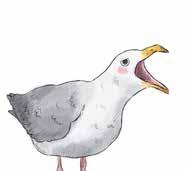
What came first? The bloodthirsty gull or the endless and gullible flocks of treat-laden Arts students? Indeed, before your inevitable face-off with these snack-loving winged-things, you should probably know that they have your best interests at heart - it seems that they have a peculiar taste for all of your guilty pleasures, sweet or savoury. Just last year, in fact, the seagull was seen to have developed a liking for halfsmoked cigarettes! This friendly bunch are certainly a native and permanent breed to Trinity, and may teach you a lesson or two in staying vigilant whenever you may decide to treat yourself to a cheeky pastry.
In his ruthless and selfless pursuit of peace and quiet, our resident library snatcher has yet another year of painstaking work ahead of him, with the incoming undergrads as fresh(ers) meat. His hush will silence and strangle even the most enthusiastic of conversationalists, and his closing-hour bell seems to stir that dusty part of the soul you thought didn’t exist. By the time you hear him, it’s already too late, because he will subsequently find you in even the darkest of corners. It is not all doom and gloom for our friend, however, as he is often seen in fabulous humour upon end-of-term, when the obnoxious library-rats vacate for holidays.
As we begin our conversation over Zoom, Louise says to me, “I have a lot of feelings about my time in university… sorry Emma, there’s a lot to unpack here!”
Louise Nealon, award-winning author of Snowflake provides an alternative (and may I add an extremely refreshing) reflection on her time in Trinity. She steers away from the stereotypical view that college life presents itself as and offers a real authentic experience.
Louise graduated from Trinity in 2014, receiving a degree in English Literature. Originally, she started Trinity in 2009 studying English with philosophy. Following in the footsteps of her secondary school English teacher, she describes herself as “impressionable” as a teenager as she chose her teacher’s course English and philosophy as her first choice on the CAO form.
“I had no idea what philosophy even was.”
After six weeks, realising that philosophy wasn’t for her, she dropped out and re-entered Trinity a year later. She never understood the fascination that has been ingrained in so many households about attending Trinity. She says that there were very few people in her school from Kilcock, Co. Kildare who placed a Trinity course on their CAO, let alone attend Trinity in September. However, when she arrived on campus, she described how there was a lot of excitement amongst students to be in college and not just any college, but Trinity College.
“There were a lot of people in my course who were from schools in Dublin who were very excited to be there and I was not excited at all.”
“I kind of had a chip in my shoulder about it, there was nothing wrong with them, nothing wrong with being excited about being in university its really natural but
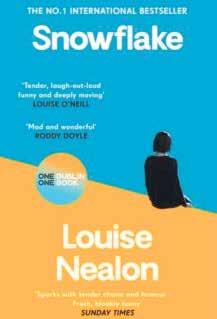
I was at a point in my life where wasn’t able to get excited about the kind of freedoms of university.”
She also commuted in her first two years of university, describing the impact that this experience had on her, “Its another kind of way the college experience can be so different because everyone has this idealised version of leaving home but you still have one foot at home … You’re moving from your often childhood family home to life and freedom and then having to come back.”
On describing the Trinity divide, Louise says “I kind of looked at people on my course like they were characters in a reality show and that there was a wall between us and anytime that fourth wall came down was in tutorials … people annoyed me or fascinated me but I didn’t think it was an option to make friends.”
“A lot of that was down to the attitude that I had and my own prejudices about the college I was going to, I was put off by people’s accents and where they went to school.”
As all arts students can relate, the agonising reality of an arts degree haunted Louise while studying at Trinity too. Louise tells me, “I always knew I wanted to write but never knew I could make a living out of it.” She spent a year studying French alongside English to pursue a career as a secondary school teacher, “I was always worried about what else was going to do to kind of fund this need that I had to write.”
Ultimately, she committed to single honours English, saying “I realised if I was to do any other subject in university but especially in Trinity wouldn’t have stuck it out.” Louise shows huge enthusiasm for her English classes. She names some of her favourite classes, which were taught by Deirdre Madden, Margaret Robinson, and Brendan O’Connell. She still fondly remembers Brendan’s tutorial on Sir Gawain and the Green Knight.
However, with writing also comes fierce rejection (another arts student’s joy). Louise says:
“I sometimes did well in exams and essays and sometimes didn’t… And used to really beat myself up when I didn’t… And I think that’s a lot like perfectionist tendencies… looking back the majority of us did.”
In terms of involvement with clubs and societies, Louise says she sent a couple of submissions to Icarus but “got rejection emails left, right and center.”

“I genuinely isolated myself in my college life, the only thing I got involved in was camogie… because its what knew”
On this topic of rejection, I asked Louise what her advice would be to students facing the same rejection in their writing today.
“I’ve gotten more confidence out of being rejected than accepted. If you’re accepted that’s lovely but you don’t learn anything from it. If something is rejected you’re kinda like okay that’s what I need to work on And that’s exciting that you have something to do.”
Although, even though she can give the advice, she knows her fresher self wouldn’t take it. “As much as would love to go back and give all these words of wisdom .. I know that would just do the same thing anyway.”
She acknowledges, “If I hadn’t gone through what did, I wouldn’t have written Snowflake.”
She went to the Student Counselling services and has described her experience with counselling as a “mixed bag.”
“I really thought that I would feel better in myself if I did well in exams or essays, and even if I didn’t feel better, that the loneliness would be “worth it” in some way. learned the hard way that it was this constant striving for academic success and external validation that was making me miserable. It’s something that I
saw in so many of my classmates, a toxic perfectionism that is so entrenched and normalised that it still makes me sad to think about, because it kills the joy of what we’re there to do which is to read stories and think about them.”
“I was so impatient with myself. All the emotions ended up turning into something that I was able to write about.. and in turn to support myself financially and make a living from. If I had known that back then I really wouldn’t have believed it.”
Louise’s experience is a true reflection of so many college students today. Louise recalls, “I spent so much of my time in Trinity outside Trinity walking around Dublin because felt like I didn’t belong in Trinity so much.”
It can be such an invalidating feeling to not lead this stereotypical college life but in reality, so many are feeling this same way. The only reason why these people’s feelings aren’t accounted for is because it doesn’t fit into the idealised version that society has portrayed college life to be, and more in particular, the generational pressure placed upon students attending Trinity.
Every student can have an extremely formative experience, it just doesn’t have to be
Could you tell me a bit about your experience in College and your education background?
I did an undergraduate in law in UCD (including a year studying abroad at UNSW in Sydney, Australia), and then an MSc in international politics in Trinity.
I heard at a talk you hosted that you were once involved in student journalism as well could you describe this a little bit? also were you involved in other extracurricular activities?
I had a confusing situation at the start of my undergraduate where my Leaving Cert English mark was added up wrong, so I was offered law in both UCD first and later (when they corrected the mistake) in Trinity, but by that time I was settled into UCD and decided to stay there. wasn’t totally removed from Trinity though: in my first year in UCD, I played percussion in the Trinity orchestra, because they were short a player.
a straightforward path as it has been labelled to be. As Louise describes:
“You learn so much about yourself. The best gift I gave myself now is that I learned so much about myself in that period of time and so much that I wanted to be in the world. With reading lots and writing lots and finding out how best to connect with other people. It was really really messy took wrong turns and an awful lot of support from family and friends back home.”
Louise ends our conversation by saying, “If you’re not having the best time, that’s okay too, not everyone is going to be bopping around on freshers’ week and wanting to get stuck into everything.”
“All you have to do is live it and come through it and you’ll come out the other end.”
I actually was too scared and shy to get involved in student media in my first year, but in second year started writing for UCD’s University Observer. I did mostly music-related interviews and later some news-related features, and got some cool opportunities because I became known to the editor as the person who would always say “yes”. In Trinity, during my master’s, again wrote a bit, I think for the University Times. also did some other extra-curriculars, like a bit of debating (with the UCD L&H and later one of the Trinity societies, though I honestly forget which one). In UCD, also worked in the student bar and was a “student ambassador”, which meant we were paid to give tours for secondary school students. In fourth year got a job as a research assistant for one of the politics professors, which wildly meant I had my own office. I also did a lot of going out and general socialising, which I think is very important when you’re at college. During my master’s in Trinity I was involved in designing and running journalism classes for Trinity Access Programme students actually can’t remember at all now how that started, but it was really cool to be involved with.
How did you get on in Trinity specifically?
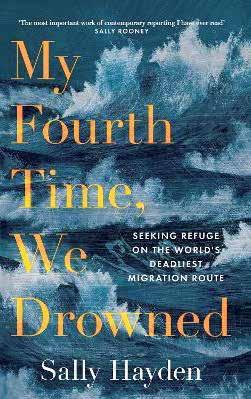
I always had a niggling question about whether I had missed out by not going to Trinity, so it was great to get to experience it for my master’s. I have to say that the transition from law into international politics was initially a bit rough there was a lot of terminology and ways of thinking that I was not familiar with, and many of the rest of the class had been there for their undergraduates and were much more comfortable in how they spoke (and participation marks were a thing). But am very glad I had that year to learn and expand my knowledge and test my abilities.
I would say that I was moderately social. Doing a master’s can be a slightly different experience if you already have a wider range of friends outside, and you are not as reliant on getting on with the people who you are put in a class with. But loved that got to meet people who were passionate about the things I was interested in.
What was the highlight of your college experience? Any lows?
I made amazing friends whom am still friends with - don’t even live in Ireland anymore and I’ve still managed to see a lot of them even this summer.
I can’t think of major lows, though generally I do think that I was too shy and there were many more opportunities could have taken advantage of, but also everything is a learning curve so I don’t really feel regretful about that.
What advice would you offer to incoming Trinity first years?
Don’t be afraid to be passionate about the things you are interested in, or to get involved in the things you really want to do - you are finally breaking free from the school curriculum and timetable. Now you can decide what you care about and how to spend your time. Be friendly to everyone unless there’s a good reason not to beyou never know where these people will turn up again over the coming decades or what they’re dealing with under the surface. Don’t let other people make you
‘My Fourth Time
Solace, and Perspective for First Years
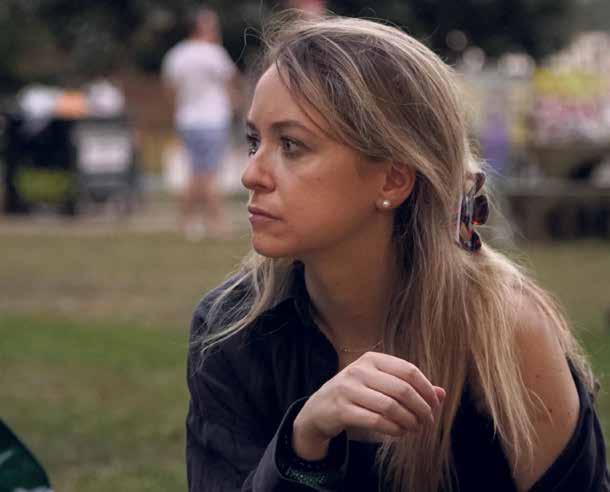
feel small. You are following your own path - a life you can discover and design - and it’s going to be so exciting finding out where it will lead.
“ You are following your own path - a life you can discover and design.”
Don’t worry if other students, or even lecturers, underestimate you: everyone has their own way of connecting with this world and some may not be as loud or obvious but it doesn’t mean that you won’t achieve great things if that’s what you want.
Also, it’s totally fine not to know what you want to do after college. I applied for so many different jobs and journalism was the thing that I kept coming back to, but it took me a long time to admit (even to myself) that it was what I really wanted to do (and also to
get over the embarrassment that came from having your work made public).
What advice would you give to your younger self? I realise this is a bit of a cliqué question, but it might help someone - I remember my first year I was very unsure about how to go about living in the world, let alone studying!
wish I had been less anxious about things like what people thought of me. Also people talk about “being yourself”, but it’s good to recognise that you are also a work in progress, and it takes time to know who you really are.
Find the people who you feel good around and support them too. It might take time to find your tribe but when you do, make sure those people know that you value them. Forgive yourself when you make mistakes (we all make many, and will keep making them for the rest of our lives). Learn to laugh as much as you can.
Be aware of your privilege and do not become disconnected from the world around you (not only inside Ireland). You have a voice and far fewer reasons to be frightened or cynical than older people, and that’s something you should not feel shy about. Question systems and your place in them. Speak up
for those who can’t, or - even better - raise their voices too. Everyone has the power to make this world a better place, even if just in very small ways.
What valuable things did you learn outside college while you were studying?
I tried to get as much outside experience as I could, applying for all sorts of opportunities - volunteering on St Vincent de Paul soup runs; helping out at festivals; working all sorts of jobs: from being a burger chef and a TV extra, to pulling pints at Marley Park gigs or wearing a Formula One suit to promote porridge. Consider applying for all types of work experience in the coming years - this point in your life may be the only chance you have to try out many different things and get an inside look into many different environments. It might take a long time to find out what you want to do eventually but it’s helpful to figure out what you don’t like, and once you take any step in one direction you never know where that might lead you. Travelling with friends is always worthwhile if you can afford it (we slept nine in a two-bedroom apartment/later a frat house while on a J1 in Santa Barbara, for example, and it cemented our relationships for life).
An Cumann Matamaitice Mathsoc
Cuireann an Cumann Matamaitice spás ar fáil do mhic léinn teacht le chéile chun plé a dhéanamh ar ghach rud ag baint le matamaitic. Bíonn idir imeachtaí sóisialta, ranganna teagasc, agus cainteanna eolasacha á eagrú ag an gcumann seo le linn na mbliana. Tá na himeachtaí ar fáil do chách, is cuma cén caighdeán mata. Ina dteannta, eagraítear limistéar dúnta dá mball na mban agus do na baill aiteacha, limistéar ina féideir leo teacht le chéile i dtimpeallacht fáilteach agus séimh. Tá seomra an chumainn suite ar bhunurlár an Hamilton.
Tá an Cumann Matamataice ar fáil ar Instagram @tcdmathsoc.
An Cumann Gaelach
Cuireann an Cumann Gaelach imeachtaí ar siúl trí Ghaeilge. An aidhm atá ag an gcumann seo ná an Ghaeilge agus an cultúr gaelach a chur chun cinn sa choláiste. Tá an cumann seo ar oscailt do Ghaeilgeoirí de ghach chaighdéan. Le himeachtaí ar nós díospóireachtaí, péinteáil agus prosecco, agus lón saor in aisce gach Dé Céadaoin, tá an Cumann Gaelach ag bailiú nirt le gach aon bhliain. Tar chuig Seomra na Gaeilge, suite os cionn Bialann an Bhutrach i mBotany Bay, chun a bheith páirteach saol na Gaeilge i
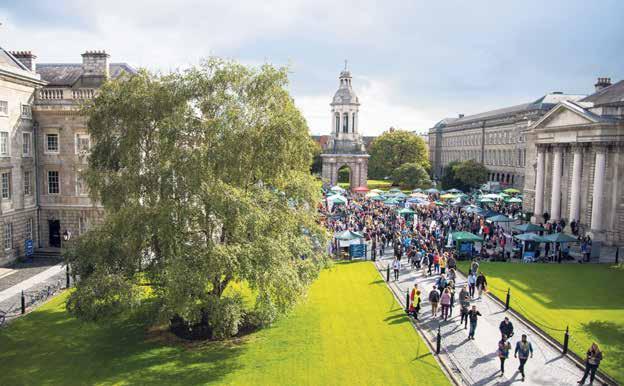
gColáiste na Tríonóide. Lean ar an gCumann Gaelach ar Instagram @ cumanngaelachtcd.
An Cumann Fealsúnachta The Phil
Bunaithe sa bhliain 1683, is é an Cumann Fealsúnachta an cumann mic léinn is sine ar domhan agus an cumann is mó gColáiste na Tríonóide. Tá ballraíocht ceithre bliana ag an gcumann seo, agus mar sin faigheann tú teacht ar imeachtaí sóisialta,
díospóireachtaí ar bhonn seachtaine, agus óráidí eisiacha ó aoichainteoirí mór le rá le linn do chéim ar fad. Leagann an Cumann Fealsúnachta béim ar chaint phoiblí agus díospóireacht. Bíonn traenáil díospóireachta agus ceardlanna ar siúl chun misneach a thabhairt do dhaoine de ghach cumas páirt a ghlacadh. Chomh maith, tá ceithre fhochoiste ag an gcumann. Tugann an Udoma glór do mhionlaigh cine agus eitnigh. Seasann an Eliz do mhná agus do mhionlaigh inscne. Cothaíonn
an club Bram Stoker dioscúrsa trí scríobhneoireacht agus léitheoireacht páipéar. Is an aidhm ag an gcoiste baill neamhghnách ná nasc a chothú le halumnais an chumainn. Cruthaíonn na fochoistí agus an gnáthchoiste cumann le himeachtaí ar fáil do ghach duine. Tá an Cumann Fealsúnachta lonnaithe sa GMB. Tá siad ar fáil ar Instagram @tcdphil.
An Cumann Timpeallachta Envirosoc
Is í an aidhm ag Cumann Timpeallachta Coláiste na Tríonóide ná inbhuanaitheacht a chur chun cinn sa choláiste. Le gníomhaíochtaí ó cheardlanna inbhuanaithneachta agus turais na siopaí cathanachtaí go cainteanna oideachasúla, tá imeacht do ghach duine ag an gCumann Timpeallachta. Tá leabharlann, dar ndóigh de théama na timpeallachta acu, suite ina mbunáit seomra tríocha trí i dteach a sé. Chomh maith bíonn margadh á eagrú acu, lena mbrabúis go léir ag dul chuig Gaza. Coinnigh súil ghéar ar a n-Instagram @environmental_soc_tcd chun a bheith ar an eolas faoina n-imeachtaí.
Trinity has an expansive number of illustrious alumni. From authors to athletes, scientists to sociologists, many disciplines are represented among the list of notable people who have studied here. And now, Luke Gibbons deserves to be added to this list.
Gibbons, an Irish Research Council-funded Trinity student in the final year of his PhD, was named on the list of “Top 30 Under 30 Environmental Educators in the World 2024” by the North American Environmental Association.
Cruthaíonn Cumann Faisin na Tríonóide limistéar ilghnéitheach chun misneach a thabhairt do dhaoine a stíl phearsanta a thaiscéal, sa fíorshaol agus ar líne. Cothaíonn an Cumann cruthaitheacht agus pearasantacht lena n-imeachtaí rith na mbliana. Bíonn malartuithe éadaí agus ócáidí shóisialta á eagrú ar bhonn rialta ag an gCumann Faisin. Cuirtear achoimre ar na feistis is fearr le feiceáil ar champus gach seachtain ar a n-Instagram @ fashionsoctcd.
So many of us come to college and try to romanticise the experience.
And there is so much to romanticise - especially about Trinity. So, here are five of the best films and series to watch this back to school season. I decided to include some lesser-known ones as well - I hope they will make you love university, or maybe just provide material for some fun movie nights with your new flatmates. Either way, there are so many others that didn’t make the cut (Saltburn, Pitch Perfect, Good Will Hunting, Mona Lisa Smile) but who’s saying you can’t watch these as well?
Normal People (2020)
I watched the series before coming to Dublin, because my friend said it actually depicts the experience pretty well. Despite it being a bit of a tearjerker, it does reflect many
common Trinity tropes - giggling at the pretentious politics students, bumping into people from your past at college parties and channelling your inner Connell in the library (English Students rise up)! However, in all seriousness, it’s actually quite nice to see your college on screen as the scene of arguably one of the greatest love stories of the 21st century. And it’s yet another reason why studying at Trinity is such a flex.
Everybody Wants Some!! (2016)
The spiritual heir to Linklater’s Dazed and Confused (1993) this movie actually helped me so much with accepting the fun, weird, hilarious and sometimes uncomfortable rollercoaster that the first few months at college are. To quote one of the characters: “you gotta accept your inner fucking strange, and that, my friend, is when it gets fun”. Following a frat house
of baseball players during their freshers week, the film explores different approaches to university life. Plus, the 80s, rock music, hippy, Texas summer aesthetic is an added bonus as the Irish fall comes creeping in.
Legally Blonde (2001)
When I asked my law-studying friend how he’s doing, he answered: “Watched too much of Legally Blonde and now I’m just powering through”. We’re all doing just that and Elle Woods, the queen of romanticising university does it best, and gets what she wants. Yes, it might not be the best representation of an actually very demanding degree, but it is undoubtedly funny, weirdly motivating, and the nostalgia that we all have for this cult classic makes it a great watch (or re-watch) for the start of college season. YOU got into Trinity? What, like it’s hard?
Real Genius (1985)
This retro comedy follows two genius Pacific Tech students who are unknowably developing a laser weapon for the CIA. College pranks, young Val Kilmer and a genuinely accurate representation of burnout (his name is Lazlo, he lives in your closet) make it a hilarious yet sarcastically realistic depiction of how it feels to balance hard work with fun, friendship and being an actually good human being. Maybe the least known film on this list, it definitely deserves a watch if you want to try something new!
Reality Bites (1995)
Well, this one is a rather post-grad movie but believe it perfectly encapsulates the feeling of having to figure out your life, which is both terrifying and freeing. The film
follows a friend group of recent graduates, who are so proud of themselves, but oh, so lost. However, they have each other (and some really good costumes, and a non-cringy-actually-very-realistic love story too). A great watch for aspiring artists, or just people who want to romanticise this time of uncertainty. Remember: “The only person you have to be by the age of 23 is yourself”!
Gibbons’s work is interdisciplinary in nature, combining law (the subject of his PhD), corporations, and environmental research. He discussed how he came to this mix of topics, stating that, “During secondary school was involved in the Green Schools committee, and that’s where my first interest in the environment came from… When I went to university, always kind of wanted to do law.” In the course of his law degree at Trinity, “you could study, say, environmental law…and so I did that, and then during the module you had to do… an extended essay, which did on corporate environmental crime. So that’s where my interest in the intersection between companies and the environment came.” After a law Master’s at the University of Oxford (during which Gibbons gained “a background more heavy in the environment that I didn’t have necessarily in my undergraduate studies”), he came back to Trinity for his doctorate. He said that, in his previous academic studies, “there wasn’t much emphasis on the
intersection between both [corporate law and climate change/ environment], and how do we hold companies accountable for their environmental harms and wrongs”. So he proposed a PhD topic to fix that lack of information on their intersections. His research looks at whether “Irish law [can] be interpreted in a way, as it stands, to hold company directors to account for the environmental wrongs that their companies commit.” And, while this currently requires some creative arguing and interpretations, he hopes that his PhD work “will shed light on this and creates a change going forward.”
Gibbons’s experience is not limited to Ireland. When he went to Harvard on a Fulbright in the United States, he was able to interact with American politicians about the environment. “When am meeting with politicians,” stated Gibbons, “particularly in the U.S. and even in Ireland,” he tries to send his message using a story. Currently, his narrative is this: “as parents, or as parents of the earth…this is our planet that we have at the moment, but it’s their future. So it’s childrens’ future, and that’s kind of like my line at the moment…this is the world we know, but we want this world to continue for our future generations going forward.” He added that “the majority of American politicians have met have been very receptive to that.”
Often, the dominant emotions people have towards the climate crisis might be fear, de

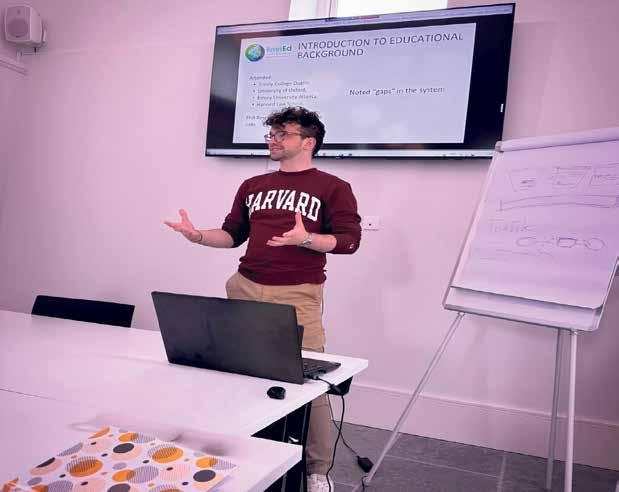
spair, and nihilism due to feeling like we as individuals are powerless. Gibbons described how he addresses this elephant in the room by putting forth three questions to his audience: “The first is, ‘must we change?’ The second is ‘can we change?,’ and the third is ‘will we change?’ And the ‘must’ part of that is the doom and gloom.”
During the “must” section of the discussion, he lays out the statistics: the number of people who’ve died from heat over the past few years, how much of the earth is projected to be uninhabitable soon, and the alarming acceleration rate of it all. He is also aware of different motivators. “The climate crisis cost insurance companies three trillion in the last decade, when the previous decade was 600 million. And if we don’t want to listen to the science, then listen to the money. Because sometimes, money talks to people more than science does.”
He has a ready answer for the “can” question. “I always say, yes, we can, because the solutions are there already.” The example he gives is about wind energy, which “is the number one source of energy in five countries…and can produce 40 times the energy the world needs.”
Here, again, he notes the relationship to the economy, stating that “last year alone, there was 14 million new jobs created in renewables. It’s an economic opportunity as well as an environmental opportunity.” Asking the second question can clear some of the “doom and gloom” people associate with
the climate crisis, showing that change is certainly possible. The third question builds on the two before. “That’s where I talk about this politics of climate change in the sense that the political power of the fossil fuel industry is so strong that the COP of Nations, both last time and the one coming up, are in petrostates…That’s because the fossil fuel industry has such a political mandate.”
“Sometimes, money talks to people more than science does.”
The theme of holding fossil fuel companies accountable is, rightfully, a recurring theme throughout our conversation. “I say, you know, we’ve answered that we must, we’ve answered that we can, and now the question that really needs to be answered is ‘will we change?’ And my strong belief is that that change comes from ad dressing this mandate that fossil fuel companies have, and the current control they have over policy
and political decisions.” Gibbons also voiced his opinions on views about the climate costs of farming and how environmental policies often treat farmers. Describing himself as “very much an advocate for the farming community” given his ties to Mayo, he stated that, “even policies from Europe that say they’re helping farmers, such as the Common Agricultural Policy [CAP], it really does not give them the money that they need to change.” Instead of focusing this much on farmers, to their detriment, he says “we should place it [the burden] on fossil fuel companies, because they contribute 80% of the emissions… Sometimes I think we just try and villainize farmers because we feel like they’ll push over and change because they don’t have the means to challenge the situation.”
Gibbons sums up his views of what needs to change using a metaphor:
“When the human body has an infection, you treat the source of the infection, you don’t just treat the periphery. And the source of the infection on the world at the moment is fossil fuel companies and the emissions that they emit. And it doesn’t make sense if we don’t start to act on that immediately and directly.”
Molly Wetsch DEPUTY EDITOR
Though former Chief MedicalOfficer Dr. Tony Holohan said that Trinity may be “the only institution in Dublin he doesn’t hold a certification from,” he does have an intrinsic connection to the school: he assumed a position as an adjunct professor in the Trinity School of Medicine in April of this year, after originally signing a deal in 2022 to teach at the university which was later withdrawn.
Using this experience and his own time spent in medical school at University College Dublin (UCD), Dr. Holohan provided advice to first-year students coming into university in Ireland’s capital. Students across the country know well the generation-defining issues that have plagued university students; the mounting climate crisis, the knock-on effects of the Covid-19 pandemic, and an international cost-of-living crisis are only a few of the concerns that directly impact those coming into university for the first time. Trinity’s status as an internationally recognised leader in research and teaching has catapulted many of the issues to the forefront of conversation both onand off- campus. What students may not be familiar with, however, is the persistence of these issues across decades. Dr. Holohan reflected on his own experience in the mid-80s as a fresher, citing a time of international and local struggle as a retrospective defining point of his university experience.
“It was a really difficult and dark time in Ireland financially as well as socially,” Dr. Holohan said.
“That’s very easy to see in retrospect when you look at the range of changes that have happened in Irish society.”
When drawing comparisons be-
tween his own university time and that of students now, there was a heavy emphasis on the intersectionality and increasing complexity of challenges that students see in the world as well as those that they face personally.
“I think the world is a much more complex place than it was in my time, or maybe just see the complexities that couldn’t see when I was eighteen,” Dr. Holohan said.
“I think that some of the the great challenges that the world faces have really kind of manifested themselves in a way that’s created challenge for young people in figuring out who they are, what their
“Follow the path that brings you toward the things that you love doing and that stimulate you.”
role is, how they should respond to some of these, how they can adapt to the challenges that these bring and continue to grow and develop as individuals and societies.”
He also said that while, for him and other students in his first year of university, these issues were prevalent, in many ways, university life served as a buffer against those problems that had been instru-
mental in the country at that time.
“I appreciate in retrospect that issues like unemployment and emigration were very much part of the reality of life at that time for lots of people, and I was very insulated [from that]”, Dr. Holohan said. “I was doing a professional course where, at the end of it, there was a job that I walked into three weeks after my finals. It’s only in retrospect that I can really understand the privilege of that.”
One could certainly argue that insulation is no longer a luxury for students in universities, as the rise of social media and communication technology has flung open doors for conversation surrounding common grievances that students share. The other side of those conversations, however, is a massive rise of conflicting narratives and the growing divide between individuals.
“Obviously just as social media is a great force for potential good in terms of communication and ease, and in terms of access to information, it’s also a significant source of both disinformation and misinformation and has shaped all of our lives,” Dr. Holohan said. “All of those kinds of issues interrelating with one another create a much more challenged context for young people.”
It is often lamented by older generations that young people live in an echo chamber of opinion due to social media. Indeed many students coming into university on the heels of the Covid-19 pandemic have faced difficulty when being confronted with those who disagree with them; likely due to a socialisation drought from months, or even years, spent isolated. Dr. Holohan’s book We Need to Talk discusses the importance of difficult conversations and finding common ground, drawing upon his own experience as Chief Medical Officer and struggles in his per
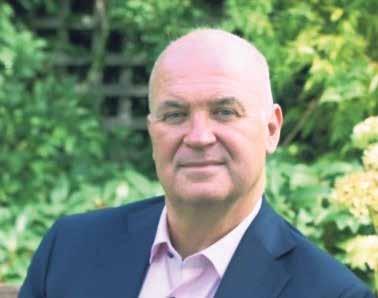
sonal life. He extolled the necessity of students especially freshers - to remain open to learning.
“Difficult conversations are a feature of life for everyone, irrespective of whether we have roles in the public service or whether it’s just in our day-to-day personal lives,”
Dr. Holohan said. “When was young, thought the whole world was black and white. Everything was either this or it was that. And the older you get, I think the more you appreciate that actually most of the world is grey. Nothing is ever quite certain.”
Though there was abundant discus sion about the problems that university students face, Dr. Holohan ultimately reflected on his time in university, especially in first year, as a medium for joy and connection.
“I didn’t know anybody, so was quite new and stepping out of the life had lived,” Dr. Holohan said.
“It was an exciting time. It was a time for new friends,
some who are friends for life.”
Despite the obvious contrast between the experience of freshers in the 80s and today, there are a few
sentiments that remain the same. Dr. Holohan’s? Trust your gut. “Follow the path that brings you to ward the things that you love, and the things that you love doing and that stimulate you,” Dr. Holohan said. “You won’t be happy in a job unless it stretches you in some way. If each day is a challenge, but a challenge in the course of doing something that you love, that is, to my mind, the advice that I would give.”
International Students Feature
Irish politics is in many ways unique, with names, practices and structures that will be new to many of you starting your journey in Trinity. With that in mind, this guide will hopefully be a helpful introductory tool so you can follow politics in Ireland as we approach a general election during this academic year.
Institutions
Ireland’s parliament, the Oireachtas, has two houses, the Seanad (Senate) and the more powerful, directly elected lower house, Dáil Eireann, which we’ll focus our attention on. Members of the Dáil are known as TDs. The President of Ireland is Michael D. Higgins, in his second and final term having been in office since 2011. The President is a mainly ceremonial position, power mainly lies with the Taoiseach (equivalent to Prime Minister). The next presidential election is due for 2025.
Elections
Ireland uses Proportional Representation by Single Transferable Vote (PR-STV) for all elections. It’s complicated but essentially, voters rank the candidates on their ballot for local constituencies where multiple TDs will be elected. This gives Irish elections a significant local element while keeping the nationwide results mostly proportional. The only other parliaments elected with this system are Northern Ireland and Malta.
Parties
The largest party is currently Fianna Fáil. They’ve historically dominated Irish politics, being the largest party after every single elec-
tion from 1932 until their historic third place in 2011,due to backlash after the 2008 economic crisis. Their leader has been the current Tánaiste (Deputy Prime Minister) Micheál Martin ever since then. A Christian democrat-esque centre-right party, they are part of the current coalition government.
Fine Gael are traditionally the second-largest party, and have been in every government since 2011, being the other major partner of the current coalition. While every government in history has been led by one of the two, this is the first time that they have been in government together. Unlike most other countries, there is no clear leftright divide between the two, with Fine Gael also being centre-right ideologically. Although Fine Gael have generally been more socially liberal, from supporting legal contraception in 1985 to abortion in 2018, many would view the parties as lacking meaningful differences today. Fine Gael is led by current Taoiseach Simon Harris, who became the youngest ever to hold the office in April of this year
The largest opposition party is Sinn Féin. They are an all-island party, and the largest in Northern Ireland, primarily focused on Irish unity. Usually positioned on the political left, Sinn Féin’s historic associations with the IRA are a source of controversy, but under their current leader Mary Lou McDonald, who took over in 2018 from Gerry Adams (leader since 1983), the party has worked to broaden their appeal and has risen to a level of support to rival to the historically dominant Fine Gael and Fianna Fáil.

The third party in government is the Greens, who achieved their best result of 12 seats in 2020.
Since going into government after that, they have lost a lot of their support and face the risk of being wiped out at the next election. Their long-time leader Eamon Ryan stood down in June, being replaced by Roderic O’Gorman.
The oldest party in the Dáil is Labour, founded in 1912 and historically Ireland’s third-largest party. In 2011 they achieved their best ever result of 37 seats and formed a government with Fine Gael. The austerity measures implemented to combat the recession resulted in them losing many of their voters and they collapsed to 7 seats in 2016. They have 7 TDs, though one was recently elected to the European Parliament and will vacate their seat. They are a centre-left party currently led by Ivana Bacik.
There are a number of relatively newer parties in the Dáil. People Before Profit and Solidarity, found
ed in 2006 and 2014 respectively, are socialist parties in an alliance, with a combined 5 seats. The Social Democrats, led by Holly Cairns, were founded in 2015 in a split from Labour, and have enjoyed a respectable increase in support, becoming the largest party in Dublin City Council at the recent local elections. Aontú were founded by Peadar Tóibín in 2019, after he left Sinn Féin because of their prochoice stance; they are considered to be socially conservative and fiscally liberal. Right to Change is another minor left wing party, currently with 1 seat. Finally, Independent Ireland was founded in 2023. Led by Michael Collins, they are a conservative party with a focus on rural issues. There are many parties without Dáil representation, including multiple far right ones.
No discussion of Irish politics would be complete without mentioning independent politicians. There are 19 TDs elected as independents in the Dáil more than in every other EU national parliament com
bined. Independents have been a mainstay in Irish politics since independence and have propped up many minority governments in the past, even being part of government on occasions (including 2016-2020). They come from all ideological and geographic backgrounds, from left-wingers like Catherine Connolly to rural conservatives like Michael Healy-Rae.
The biggest issue in Irish politics is housing, due to the ongoing crisis of high prices and low supply leading to many people being unable to afford a home and record homelessness. Recently migration has become a hot topic, with the government’s policy towards migrants drawing criticism from the left and an emergent far right in light of the issue. Other important issues are the failing health service, the cost of living crisis, and the climate crisis.
When Catherine Prasifka sits down with University Times to discuss her college years, she pieces together the formative moments that led her to where she is today.
Caught up amid a burgeoning career spurned forward by the success of her 2022 debut novel None of This Is Serious and her most recent work This Is How You Remember It (2024), Prasifka reflects on life as it is unfolding.
“I kind of feel like, at some point during the pandemic, got on this rolling snowball, and it just keeps getting bigger and bigger.”
Prasifka is currently able to live off her craft alone, something she
knows is not granted to most creatives. Perhaps to get it out of the way, she soon reveals that she is already working on a new book: “Everyone, as soon as you have a book come out [...] are like: ‘What’s next for Catherine?’”
Catherine Prasifka was named Trinity College Dublin’s 2024 Writer Fellow, which has alleviated both the creative and financial pressure of being a full-time writer. At the same time, she admits that “there is nothing worse than being like ‘You have to have an idea. You have to have an idea.’”
A returning motif in Prasifka’s novels is physical places as points of reference in life, and she is inter-
ested in depicting how both places and people change over time. On returning to Trinity as a professional writer after completing her B. A. in English Literature in 2018, Prasifka claims, smiling: “I feel like a big imposter.”
Her current role is markedly different from what she previously associated with the college; she is no longer simply going through the motions one step at a time. “It is not anything that has a certain ladder, and you are up a certain number of rungs on the ladder, and then you progress in a very linear fashion; [...] creativity is something completely different.” While she only graduated six years ago, Pras-
ifka recognises how those six years have transformed her sense of self.
“You can never really know who you are when you are eighteen. Or maybe I felt [...] I kind of knew who I was, but you only have so much of the developed self.”
She describes her teenage self as a “jack of all trades, master of none”, and though she has been writing stories since she was a child, a Single Honours degree in English Literature was not her obvious first choice. She considered pursuing a Joint Honours degree, or a “Two-Subject Moderatorship” as it was then called, but realised that she did not “want to miss out on half of English.” Coming to English
Literature through genre fiction, her experience of third-level education was a “kind of push and pull” where, at first, she struggled to fit her interests into an academic context. “I do remember being a bit embarrassed when I was like 18 and in my first class, and people were like: ‘What is everyone’s favourite novel?’ And everyone was listing off these great works with these writers that I had heard of but never dared to open a book. [...] Every class, would change my answer to something that I thought was more serious.”
Eventually, she was able to come to terms with her literary interests (cont. on next page)
(cont.)
and she ended up writing her dissertation in the fantasy genre.
“Returning to my love of fantasy is what kept me in the literary world.”
While she feels like she had a sense of self upon starting college, she describes herself as “quite shy”, something that “college debating kind of beat out of [her] with a stick.”
She recalls how she was signed up for the Hist Maidens competition against her will, and for fear of “ruining the whole competition” she decided to participate, practising her speech eight times in front of her mother. She won the round.
“All these roads have been leading to now because when you are a writer, they really want you to talk.”
As a writer, it is not possible to just write. In addition to public speaking, Prasifka also points out how
writers are pushed to participate in social media. She does not mind this too much but recognises that her relationship with social media directly relates to her self-image. College was formative in getting her used to managing an online presence. “Everyone was online all the time.” While it allowed her to keep in touch with friends from other universities she had met through debating, she looks back on it with mixed emotions. “Because everything was so new at the time, it felt incredibly stressful.”
Incorporating the internet into her novels came naturally to Prasifka, who felt like other authors were doing it a disservice by making it a big part of the story or otherwise ignoring it completely. As the internet is just a “fact of reality”, she believes it should be portrayed as such.
She admits that she only started taking her writing seriously after graduating. As a Writer Fellow, Prasifka has held creative writing workshops, but this is not something that she took advantage of as a student, citing a lack of confidence and feeling hesitant to share her work before she had perfected it. But she still holds that “the best way to learn how to write is to read very, very widely and to write yourself.” According to Prasifka, her English degree facilitated this, even if she believes “there is a difference between dissecting something critically and dissecting something creatively.”
Throughout her career, Catherine Prasifka has balanced academia and creative writing. After her B.A. at Trinity, she went on to pursue an MLitt in Fantasy Literature at the University of Glasgow and an MA
in Irish Folklore and Ethnology at University College Dublin. As humanities students are often told their degrees serve little purpose in today’s society, the prospect of graduating and finding a career may seem daunting for many.
When asked about what she would tell other humanities students who feel uncertainty for the future, she poses a question in return: “What is academia for?”
She lets the question hang in the air for a moment before continuing: “I do not necessarily think academia is for getting you an incredibly high-paid career.”
She recognises that it is a luxury to be able to follow your interests and hope for the best, but she also believes that “most university degrees equip you with very similar things.”
“What have always done is follow what I am interested in, and one thing kind of leads to another.” It is refreshing to hear Prasifka talk about her volunteer work with Fighting Words, a creative writing organisation aimed at children, as a fulfilling pastime rather than an activity to put on her CV. “What I was doing was investing in what I wanted and what I cared about.” Looking back, Prasifka thinks it is obvious that she ended up where she is today, but at the time, she did not look to the future with any specific goal in mind. “I probably would have been happy working in a bookshop or working in publishing [...]. And I was hoping that I was just slowly, brick by brick, putting myself somewhere in that direction.”
If Guinness and potatoes are what first come to mind when you think of Irish cuisine, you’re on the right track. As the backbone of our international stereotype, they have played a vital role in feeding generations of Irish people and providing us with the grounds for identity. However, believe it or not, there is more to Irish cuisine than just beer and prataí. From ancient stews to Asian-Irish fusion, Ireland provides its people with a list of must-try dishes longer than the average leprechaun. So let’s dive into the craic of Irish cooking!
When exploring Ireland, tourists expect to encounter the same meals as a native would. They are eager to dive into the dishes that the Irish hold dear – although to be fair, we probably eat them far less often than the restaurants in Temple Bar may lead you to believe. Below you will find a ranked list of the top traditional dishes found on the island. Consider this your essential guide to what’s really in store when dining in Dublin!
Irish Stew
Top of the list is Ireland’s OG comfort food, Irish stew. Basically a hug in a bowl, this thick soup is perfect when arriving home from a chilly night, or for replenishing the soul after a few hours spent in the library. A staple in Irish households, stew is consumed regularly during the winter season. It contains all the essential ingredients: a toss-up
between lamb or beef, carrots, onions, and of course, potatoes.
The Irish Breakfast
A close second to the best is the traditional Irish breakfast, a hearty spread fit for champions. Visitors on our isles will, without fail, request a portion unknowingly signing up for an Olympic style breakfast. An average plate is spilling with sausages, rashers (the correct term for bacon), eggs, baked beans, black and white pudding (whatever that is), plenty of toast, and a warm cup of milky tea on the side to help wash it all down. By the time you’ve finished it should feel like you’ve consumed an entire farm, and a food coma is inevitable.
Coddle
Next on the list is the legendary coddle. A masterpiece originating in Dublin, it is a revolutionary reinvention of the Irish stew. Simply replace the beef and lamb with bacon and sausage, add some cabbage, and there you have it. Commonly found in the kitchens of beloved Irish grannies, this generational dish may be on its last plates, but it is still not one to be missed.
Barmbrack
Boxty
Nothing speaks to an Irish stomach like a potato, and what better than a potato pancake! An authentic Irish dish, Boxty is made with the humble ingredients of potatoes and milk. Although still cherished by Irish households, Boxty is unfortunately no longer the go-to snack it once was, and is probably consumed by more tourists in a week than by an Irish family in a year.
After centuries of surviving on potatoes, cabbage, and whatever else could be thrown in a pot, old Irish meals have passed the spotlight onto quick lunches and a range of takeaways. These standout examples capture the true essence of modern Irish comfort food:
Chicken Fillet Roll
Ask any Irish citizen what the star of Irish cuisine is, and the answer is more than likely to be the iconic chicken fillet roll. The ultimate
A firm favourite of both tourists and locals is Barmbrack, a funfilled treat particularly associated with Halloween. Barmbrack is a fruit bread typically made with dried fruits such as sultanas and raisins, occasionally with a splash of whiskey thrown in to enhance the flavour. It is traditionally served with a dash of good old Irish superstition by adding small items, such as a coin or a ring to the loaf, believed to predict the future of the lucky finder. A slice of Irish culture, it’s essentially Ireland’s version of a fortune cookie. The charming tradition of Barmbrack is said to date back to Celtic times, the combination of its rich flavour and an element of surprise keeping it devoured through the ages.
hangover cure, the chicken roll can be found at any respectable deli. There is no official recipe for a chicken roll, allowing for the individuality of the creator to shine through. General guidelines include a fresh breaded chicken fillet (plain or spicy), resting in a soft baguette and layered with condiments and toppings of your choosing. Where to acquire the

best chicken roll on the island is a topic of national debate, but many Dubliners would send you in the direction of Gay Spar’s 24/7 deli or their local Supervalu. No two chicken rolls are the same, which makes them the irreplaceable, occasionally messy ride-or-die dish of the nation.
The Spice Bag
The spice bag seemingly graced
There is a rich musical history associated with the city of Dublin. Acts such as U2, Thin Lizzy and Sinead O’Connor formed their musical identity here before breaking into the world stage. In recent years, the likes of Fontaines DC, Hozier and CMAT have gained critical acclaim, performing to audiences all over the globe. As is the case with most artists, each of these musicians has been considerably influenced by the place in which they grew up. Themes of Ireland, and Dublin particularly, are inescapable across each of their repertoires. We see the ways in which Dublin heralds its musical tradition all across the city, from the Irish Rock ‘n’ Roll Museum in Temple Bar, to the various music history walking tours which take place each day.
But how meaningful are these attractions? For a city of such rich history, there is an overriding neglect of the music scene in Dublin which we see through the decline of live music venues or the lack of support provided to local artists.
Consider the SFX Theatre as an example. It used to be a concert venue which opened its doors to the people of Dublin in 1957 and hosted a wide range of Irish acts, as well as other performers such as The Smiths or The Clash. It stood as a pillar of Dublin’s live music scene until 2001 when it was shut down and its concerts were relocated to the Ambassador’s Theatre. Whilst one could assume that the SFX was closed to be renovated into something of equal cultural significance, the truth is that the venue was demolished in 2006 to be replaced by an apartment complex. Meanwhile, the Ambassador’s Theatre down O’Connell Street stands empty most nights of the week, other than for the odd live podcast hosted there. Closures such as these are a reflection of Dublin’s passive attitude towards music. No active attempt is made to implement policies which would protect Dublin’s music scene, and local artists feel the severe impact of this situation. Shain Shapiro, a leading music and cultural policy thinker, wrote the book This Must Be The Place on
this very issue. Shapiro states that each city has its own music ‘ecosystem’, formed through a wide range of factors. He highlights the consequences stemming from events such as the closing of a music venue. The SFX Theatre remains a good example to communicate his concerns. When the theatre closed, a person whose first concert experience was seeing R.E.M. at the venue in 1984 will feel a sense of personal loss. Additionally, the light and sound technicians that worked at the SFX are now jobless, and some of them may begin to seek a different type of work due to the dwindling live music spaces in Dublin. The concert promoters who booked performers at the theatre for over a decade now have to seek alternative venues for their acts. Perhaps they will find a suitable one, or maybe they will decide not to consider Dublin for a spot on the next tour. Furthermore, local artists grow uninspired with their surroundings and decide they must leave the city to creatively flourish. In consequence, the people of Dublin have less access to live music and its positive
us with its presence for the first time in the 2010s, and little did it know the status it would reach. It is served in Chinese takeaways all over the country as a fun fusion of Chinese flavours and classic chicken chips. For those unfortunate enough to have never tasted or even laid eyes on one, a spice bag is a glorious mix of golden chips, crispy chicken, onions and peppers all coated with a rich mix of herbs and spices. Handed over to the buyer in its classic paper bag, the spice bag is usually a late-night indulgence after a night out, with the average Irish person unable to last two weeks without one. It’s a dish that brings the community together, transcending the social classes and loved by all.
There clearly is no shortage of tasty meals to lay your hands on while in Ireland. While some dishes are more worthwhile than others, all involve traditional elements embodying the Irish experience. There is something for everyone, from fast food to hearty soups. Whether you’re after a quick bite or a comforting meal, these Irish dishes offer a range of flavours that leave a lasting impression and a deeper appreciation for the rich culinary tradition of the island.
The first year of university is an exhilarating time, filled with many new experiences, and Fresher’s Week is one of the most anticipated. As an international student in Dublin, the concept of Fresher’s Week was entirely new to me, but I quickly realised it’s a week dedicated to getting to know Trinity, your peers, and, of course, Dublin’s nightlife!
Pre Drinks (Pres)
Every great night out begins with pres. If you’re looking to avoid lukewarm drinks in a crowded flat, consider starting your evening at Keaven’s Port or The Pav. Keaven’s Port, located in Camden, is the go-to Wetherspoons for students. Although it’s packed on Monday or Thursday nights before heading to Dicey’s or DTwo, it’s the best spot for cheap drinks and food, making it a perfect place to kick off the night. The Pavilion Bar, affectionately known as ‘The Pav’, can be found on Trinity College’s campus. As Trinity’s campus bar, it’s a prime spot for new students, especially on Friday nights when it’s buzzing with activity. Societies like DUDJ often host live music, adding to the lively atmosphere. The Pav offers a variety of drinks at lower prices than many other local bars, and if you’re hungry, their menu features tasty options like pizza,
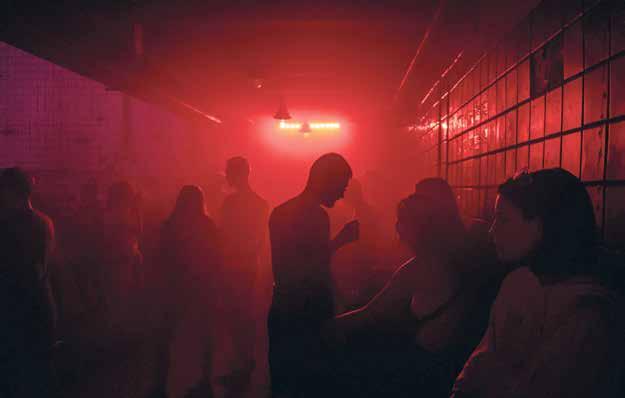
chicken, and chips, ideal for a quick bite on campus.
Dublin’s Pub Scene
Doyle’s is just a short walk from campus and is a staple among students of all years. Most popular on Thursday and Friday nights, Doyle’s offers a mix of a traditional pub downstairs and a lively dance floor with a club-like atmosphere upstairs. While it’s a classic spot, be prepared to spend a bit more,
as one pint will set you back €7.20. For those living in Rathmines (particularly Freshers who find themselves in Halls), Mother Reilly’s pub is a hidden gem. Though it’s small and can be tough to find a seat, it’s well worth a visit—especially for their pub quizzes on Tuesday nights (be sure to book a table in advance)! With its cosy booths and brick walls, Mother Reilly’s exudes the charm of a traditional Irish pub. If you’re feeling peck
ish, grab a few friends and share the full kilogram of chicken wings for €18.95.
Club Scene
Dicey’s is conveniently located near the Harcourt Street Luas stop, across from DTwo and close to Copper Face Jacks. While often 21+ on other nights, Monday is student night, making Dicey’s the place to be for great deals. During Fresh-
er’s Week, it’s especially crowded! DTwo, just across from Dicey’s, might appear small from the outside, but it opens up into a spacious venue with a large open-air smoking area and an upstairs. It hosts many themed nights including Taylor Swift and Country! It’s a versatile spot that’s worth checking out.
Alternative Nightlife If traditional pop music clubs aren’t your scene, Dublin has plenty of alternatives that might be more your style: The Workman’s Club is located just north of Trinity’s campus and offers a unique mix of a traditional pub feel with a vibrant arts space. The venue hosts an array of events, from live music to comedy shows and club nights, making it a great spot for those seeking something different, particularly on the unofficial Workman’s Wednesdays. Fibber Magees is a must-visit for rock and alternative music fans. This venue features a variety of live bands and DJs, with everything from classic rock covers to emerging local acts—don’t miss Bowie Night! While it might seem small at first glance, Fibbers opens up into various rooms, including pool tables, a connection to a shisha bar, and even a pizza restaurant in the smoking area.
effects. With each closure, the wider music ecosystem which exists in the Irish capital is harmed and the city’s music culture is weakened. Music holds importance beyond streaming platforms. The ability to attend concerts or listen to local artists busking on the street enriches our everyday experience. It is a simple truth that music makes our lives better and this is what Shapiro’s research endeavours to highlight. He aims to convey that
if policy-makers viewed music as a tool for economic growth and took action to preserve the city’s music ecosystem, then everyone from artists to the wider community would benefit. The unfortunate reality remains that the music scene, along with so many other artistic aspects of the city, is not being protected in Dublin. The result is even larger emigration and ultimately - a loss of culture, which touches us all.
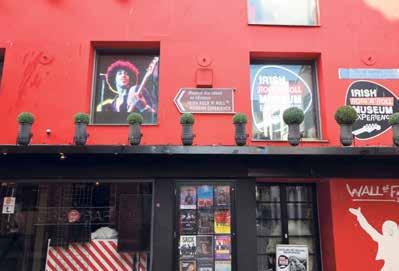
Let’s set the scene: there’s a throng of people surrounding you on campus, some of whom look as though you saw them at the fresher’s event the previous day, but almost everyone feels like a stranger. You’ve put yourself out there and tried your level best to meet new people, but nothing seems to be perfectly clicking with any specific person. You seem to be caught in the conversational loop of “What course are you studying?” and “Where are you from?”. You’re exhausted, and as you sink into your bed, the fear that you may not be able to make friendships as quickly as you’d hoped, begins to creep in. Every new college student is eager to meet their future best friend within the first few weeks of starting, and maybe this does happen for a lucky few, but it’s completely normal if it doesn’t. If you’re wondering how I know exactly what you’re thinking, rest assured that this is indeed the standard ‘freshers experience’, and through a few embarrassing anecdotes, I’m confident you’ll find yourself agreeing with me by the end of this article.
Starting with an ‘If I survived this, you can survive absolutely anything’ experience to kick things off. During the first week of classes, I inevitably caught the freshers flu and tried to stifle a cough in the hopes of avoiding embarrassment in a sociology lecture with over 200 people. This turned into a full-blown coughing fit within seconds, and I was escorted out of the class by a few TAs and the friends who were sitting next to me. The next day, met someone new who said they were studying sociology.
When asked them which lecture they were in, they described it as “the one where that poor girl was coughing maniacally and had to leave the class”. Imagine the laughs (my tears) when had to admit to them that I, in fact, was the maniac. While this person and I may not be friends today, I’m closer than ever with the people who took me to the health centre in the middle of this class. I think this experience quite literally shook the social anxiety out of me and made it so much easier to stop worrying about what
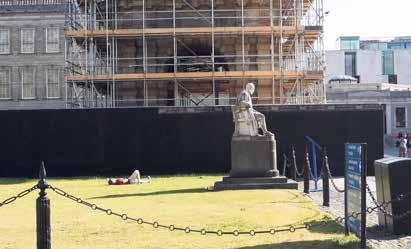
The truth is, everyone is so preoccupied with worrying about how other people perceive them during their initial interactions that the focus on simply connecting and engaging in the conversation often gets lost.
people may think of me. Instead, I began trying to savour the present moment with the people around me. Since wouldn’t recommend experiencing this realisation the way I did, this article serves as a guide to help you along the way! The truth is, everyone is so preoccupied with worrying about how other people perceive them during their initial interactions that the focus on simply connecting and engaging in the conversation often gets lost. Every new college student is probably on the same boat as you, looking to make connections and meet a variety of people. So, don’t hesitate to walk up to someone, compliment their outfit and start a conversation! But the most important aspect of this is to not attach too much importance to every single interaction and pressurise yourself to find your tribe within a specific time frame. Trust in your personality and know that by simply doing the things you love, joining clubs and going to events, you will begin to attract the people you will end up spending the rest of your year with!
Dublin is a great place to study if you love theatre. With some of Ireland’s most famous theatres right on your doorstep and the Dublin Fringe Festival and Dublin Theatre festival both taking place at the end of this month, you will never be short of something to see!
If watching all these shows have you itching to get on stage (or backstage) you need look no further than Trinity’s own societies.
I sat down with the Chair of DU Players, Fiona Murray, and the Chair of Trinity Musical Theatre Society (TMT) Connie Angela McGowan to learn more about their plans for the upcoming year and how students can get involved!
Now leading their respective committees, the pair reflected on how they both got involved with their societies. McGowan found TMT on the Central Societies Committee (CSC) website and auditioned for TMT’s 2022/23 production of Sweet Charity. McGowan noted how at the audition she was “a ball of nerves” but after successfully getting into the production “met one of the best communities and one of the best groups of people I’ve ever met and I just never looked back.”
Also starting her campus theatre journey in an audition room, Murray fondly remembers auditioning for her first Freshers Show to get to know people, get involved, and see how things worked in the society.
From there, Murray, who had previously only been involved in the performance end of theatre, got more involved with the behindthe-scenes side of theatre through Players’ various intern programs. One’s first thought when it comes to theatre is often that of perform ing. Murray provides an alternative
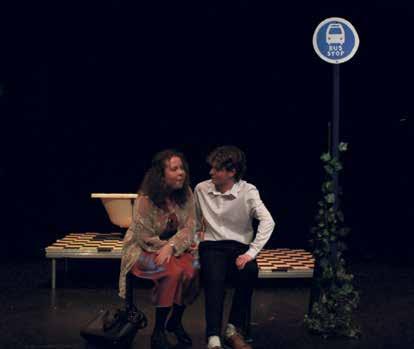
way to get involved with the Players Introductory Program (PIPS) which covers various disciplines in theatre from lighting to writing; “It’s a super good gateway into the society and into theatre itself. For me I’ve really gotten into management and I didn’t really know anything about management within theatre before joining Players.” Additionally, the shows in these societies are completely student-run so there are plenty of opportunities to join a production team. McGowan explains, “if being on stage isn’t your gig there’s plenty of room for you behind the stage! We have an array of production team opportunities throughout the year whether it be costume design, stage management, set construction, directing and there’s always the opportunity to run for committee at the AGM every year to take part in the overall running of the society.”
McGowan shared how her team’s main focus this year is “inclusivity and opportunity” which is why for the first time in the society’s existence there will be two annual productions as opposed to one. The shows this year’s committee have decided upon are Footloose and Into the Woods. With a focus on inclusivity, McGowan stressed that to get involved with TMT you don’t need any prior experience; “The beauty of TMT is our members are incredibly diverse and come from degrees of all kinds. Our committee alone has people studying maths, law, pharmacy, film. Any course you can think of we probably have a member studying it. You do not need any experience whatsoever to come join us. We have members who came out of the womb singing and dancing and we have members who are walking into the audition room for the first
come involved or reach out for help, all of which can be found on the TCDSU website: tcdsu.org
For anyone looking for assistance in issues surrounding learning conditions, discrimination, classism, and inequality, the Trinity College Dublin Students Union (TCDSU)will be that voice. They are incredibly involved in what is happening around campus, and are elected by the students themselves. There are many ways to be-
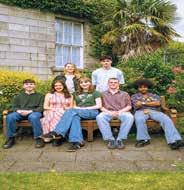
time in their life. TMT is the perfect hub to grow and nurture your talents or just have a bit of craic on a week night if you’re looking for it.”
Players’ plans for the upcoming year entail an equally busy year ahead, including a packed Freshers Week and a variety of workshops. Most notably for newcomers are the Freshers Shows. Murray explains that these shows are targeted towards people without any prior experience in a Players production t. “We’ve made it that way so we can get as many new people involved and make it a bit more low stakes… just get to know people and try stuff out that you never have before.”
Both societies have a lot to offer anyone with an interest in theatre, but they offer much more than that.
The community aspect of Trinity’s student theatre scene was
noted as the best part of the respective societies. Murray explained, “theatre really is something that brings people together and creates a community and you can see the talent of so many different people whether it’s in a creative way or in a managerial way and it’s just a really special place.” McGowan echoed this sentiment in her response, “I really believe the members make TMT what it is.”
If either (or both) of these societies take your fancy but you are still a bit nervous to take the first step, our society Chairs can empathise. Murray recounts how she came to Trinity “not knowing anyone” but taking the leap to join players was “so worth it” to meet all the amazing people and learn new things. So, as McGowan puts it, “Embrace the nerves and do it anyways,” and get involved with some theatre on campus this year. Break a leg!
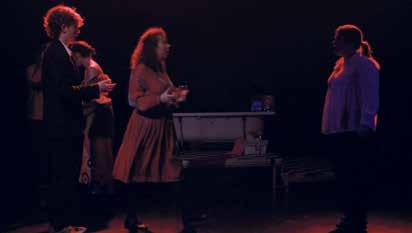
You’ve heard the rumours. You saw the grade of knitwear they had on in Normal People. At Trinity, fashion is a matter of life or death. But fear not. I, of final-year-student-who-was-once-featured-inthe-hallowed-halls-of-FashionSociety’s-campus-couture-Instagram-series-at-the-end-of-the-daytwo-years-ago-when-they-neededto-fill-up-the-slots fame, am here to help. Here is a list of what to do and what not to do in order to thrive on the red carpet of your first year at college.

Out Being yourself. Starting off strong, it’s best to get this one out of the way. For many people coming to college for the first time, an eternity of kill-or-be-killed school groupthink has lead to years of stifling the creative expression involved in who they truly are. Why break from tradition now?
In Copying what everyone else wears. Stepping foot into the arts block is like making your way through a lion’s den of Gen Z’s answer to Miranda Priestly. How else will they know to respect you if you aren’t decked out in the world’s nine millionth pair of Sambas? In the Hamilton, they will also be wearing clothes.
Out
Dressing comfortably. If you’re anything like me, you toiled so hard to get here that education is now uniquely tied to an acute sense of suffering. And from here on out, the words only get longer and the assessments only more difficuly. What you wear should phys-
ically reflect that. I’m talking wool on bare skin. I’m talking glue-tight shapewear. At third level education, full sensory overload is unfortunately required.
In Putting fashion first. You’ve got your whole life to be a good person. Right now, life is a runway, and college is centre stage. Be sure to allot sufficient time at your great aunt’s birthday tea to scroll through Vinted in search of the 2007 silver astroturf football boots you saw someone wearing on the LUAS on the way over there, and take a scientific level of dedication to the ‘are you a cool autumn?’ online colour palette quizzes when you sit at the back of the lecture hall.
Out
Stepping out in that pair of last decade’s favourite skinny jeans. Whatever you do, don’t even think about it. It will not be fruitful.
In Preparing an elaborate backstory to reminisce about the good old days of your clothing past. Yes, I
went to an all-girls Catholic private school in a leafy south Dublin suburb. Yes, the kilt was so ‘90s grunge. No, can’t believe they want to get rid of the tax break.

Out
On a course/school/faculty level the Class Rep is who will champion students who need assistance with exams, lecturers, timetables and more. They will contact the head of departments and deans for you. The School Convenor is who manages the Class Reps, and there is only one of them assigned to each of Trinity’s twenty-four schools. They are who will represent the students at School Executive meetings. Above them are the three Faculty Convenors and their Deputies. Every two weeks there is a Union Forum held for members to report on their work, direct the student union’s campaign strategy, discuss items for the SU Council and ensure the union is managed properly. The SU council is held seven
times a year and is the main-policy making institution.
There is then the Sabbatical Board made up of five members who all have more specialised responsibilities.
First, there is the Student Union President who oversees union finances, management, and campaigns. This year’s president is Jenny Maguire who’s email is president@tcdsu.org
Next is the Education Officer who organises union representation at that Course/School/Faculty level and provides support on a wide range of academic issues. The Education Officer is Eoghan Gilroy who’s email is education@tcdsu. org Then there is the Welfare & Equality Officer who looks after the welfare interests of all Trinity students on an individual basis by representing their needs to committees
like the University Board and subcommittees such as Healthy Trinity. The Welfare and Equality Officer is Hamza Bana who’s email is welfare@tcdsu.org
The Communications & Marketing Officer oversees commercial sponsorship for the union campaigns and services while also managing the TCDSU website, social media, printed materials, and communications strategy. The Comms and Marketing Officer is Beth Strahan who’s email is communications@ tcdsu.org
Finally there is the Ents Officer who organises social events for Trinity students. The Ents Officer Chair the Ents Committee which puts together things like pub crawls and live gigs, among other things. The Ents Officer is Peader Walsh whose email is ents@tcdsu.org
Pádraig Mac Brádaigh is the Oifigeach Gaeilge, a new role which
was created last year to promote the Irish language in all aspects of campus life. A fierce language activist, he is available to help you with all things to do with the promotion of the Irish language. You can reach him at gaeilge@tcdsu.org
Though not a Sabbatical Officer, Brídín Ní Fhearraigh-Joyce is the editor of University Times. Her email is editor@ universitytimes.ie if you are interested in getting involved in Ireland’s best newspaper.
The TCDSU is a resource that is always available to students, even if the office is only open from 9:30 a.m. to 5.30 p.m. They are the students’ voice to the administration, and are very willing to lobby on their behalf. Do not be afraid to contact them and have a great year!
Welcome to Trinity, freshers! For many of you, it’s also a welcome to Dublin. After weeks of packing, you’ve finally arrived. Yet soon enough, the inevitable realisation will hit—you’ve forgotten something. While Google might point you towards Penneys, Dublin offers much more beyond the mainstream shops. The city is a haven for unique shopping experiences, from vintage shops filled with one-of-a-kind finds, charity shops where your purchases contribute to worthy causes, and independent boutiques or market stalls showcasing Ireland’s talented designers. Dublin’s shopping scene is as diverse as it is sustainable. So with coursework still light, why not reach out to someone you clicked with in Freshers Week and wander through the city’s vibrant streets together, explore its vintage racks, hunt for treasures in charity shops, and pause for coffee in a cosy café or venture into a nearby museum. By the end of the day, you might walk away with more than just a great find—you could gain a deeper connection to your new home and, if you’re lucky, the start of a lasting friendship.
Shopping Near Trinity Hall:
If near Trinity Hall, Rathmines and Camden Street are your go-to areas for sustainable shopping. Rathmines is home to a cluster of charity
shops such as Irish Cancer Society, NCBI, Oxfam, and Vincent’s (SVP).
The Irish Cancer Society shop, though small, is well-organized and frequently refreshed with new stock, making it perfect for regular visits. Vincent’s is another gem, with a mix of affordable items and a dedicated “elegance” section for more upscale finds. These spots are great for students who need to furnish their rooms or update their wardrobes without breaking the bank.
Camden Street is packed with charity shops such as Liberty, Enable Ireland, and Dublin Simon Community. You’ll find everything from vintage clothes to second-hand furniture. The Dublin Simon Community shop, in particular, has a fabulous selection of dresses, perfect for special occasion wear.
Shopping Near Kavanagh Court:
For those based in Kavanagh Court, Vincent’s near Mountjoy Square is a large charity shop that’s perfect for bargain hunters, with a wide range, from household goods to clothing, and frequent flash sales; it’s a must-visit for students on a budget.
Monto on Parnell Street is a lesser-known gem, ideal for those who enjoy browsing accessories, vintage magazines, comic books, and unique clothing. This shop is also worth noting if you’re looking for a pair of jeans. Just remember to
bring cash, as it’s a cash-only shop. Oxfam Ireland on Talbot Street is another conveniently located option. This branch is well-stocked with hidden treasures, and you can often find great deals. Francis Street, not far from Kavanagh
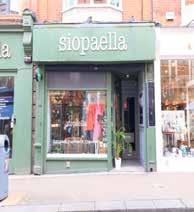
Court, is Dublin’s art and antiques corner, home to shops like Oxfam Home, one of the city’s most popular charity shops. For a slightly less crowded environment, head to Capel Street. Here, you’ll find a range of charity shops like CASA, Enable Ireland, and NCBI, each offering affordable pre-loved goods. The Vintage Shop Capel St is a treasure trove of brica-brac and vintage cameras, while Antiques and Interiors Vintage Dublin is perfect for those interested in home decor.
Listening to me. In fact, maybe do the exact opposite of what I say. I’ve spent the past four years going to a college full of stylish people and I still wake up every morning tearing my hair out trying to think what to wear. There is truth to every stereotype, but for every judgemental, sheltered, closed-off person or hair-raising essay you come across, there is someone else who has wonderful, and eye-opening ideas you’d never even thought possible before.
City Centre Hotspots: Temple Bar & in and around Drury Street: Although Temple Bar is often associated with tourists, it’s also home to some of Dublin’s most unique shops. Lucy’s Lounge and its vibrant pink exterior is a quirky spot for reworked and vintage pieces. Nine Crows blends vintage fashion with contemporary trends, offering pieces that stand out. Collected Treasure is also worth a visit for its curated selection of vintage and designer items, including preloved luxury pieces from the faux fur brand Rashhiid. Dublin Vintage Factory offers a pay-by-thekilo shopping experience. Finally, although it is on the pricier end of the scale, is the beautiful Loot, situated on the even more beautiful Drury Street. It’s worth making a visit, even if just to window shop, the area filled with up-market vintage and boutique shops such as Om Diva, Jenny Vander and Siopaella.
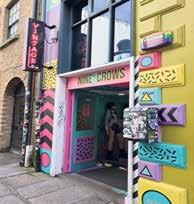

Despite whatever brush you’ve had with pure evil (or the comment section on an Instagram reel) might have had you thinking, in fashion, like in college, there are no rules. Whether you find exactly who you are by the end of your time here, ultimately doesn’t matter. This is the perfect chance to safely try on different versions of yourself and see what sticks. And if you’re authentic and kind, good things will find you no matter what you’re wearing. Yes, even in the skinniest of jeans.
Markets: Dublin’s Social Shopping Scene
If you’re after a more social and lively shopping experience, Dublin’s markets are a must. On the second Sunday of every month, Le Zeitgeist Flea Market brings the buzz with live music, eclectic vintage stalls, and local designers, creating a vibrant community atmosphere. For a relaxed weekend, explore Blackrock Market, where handcrafted goods and vintage fashion await. Cows Lane Designer Market is another weekend gem, perfect for discovering unique creations from local artisans. Though infrequent, Nine Crows hosts warehouse sales that are worth the wait—if you catch one, expect incredible deals. If affordability is your focus, Liberty Market and Jamestown Market in Inchicore are treasure troves for fashion and home goods.. Whether you’re browsing for a vintage find or just soaking up the atmosphere, these markets blend shopping with the best of Dublin’s local culture. And that’s only to mention a few... but I’m already pushing the word count here, so keep an eye out for an expanded guide in future. But for now—happy shopping!)
Abi Ní Mhuircheartaigh
Trevor Noah is a comedian, elevision host, and author. More than that, he is a man with a remarkable upbringing. His novel, Born a Crime, follows the challenges he faced throughout his childhood and adolescence under the Apartheid, a system of racial segregation in South Africa lasting from 1948 to the early 1990s. He tells the inspiring story of growing up in a world that did not want him, and his journey to becoming a successful celebrity and global influence. Noah uses humour as an instrument to confront difficult topics and come to terms with his experience living in a country

trapped by the consequences of colonialism. Born in Soweto South Africa to a black Xhosa mother and a white Swiss father, Noah was quite literally born a crime. In a country where procreation between races was illegal, Noah’s entire existence was criminalised. While Apartheid ended when Noah was about ten years old, its ideology remained and continued to oppress the black population. Noah experienced a significant amount of discrimination, from both the authorities and his peers. He could not be seen with either parent in public and was bullied by other kids in his neighbourhood. Regardless of who he surrounded himself with, Noah felt isolated and excluded—being too white for black South Africans and too black for white South Africans.
Noah’s mother, however, always stood by his side. He views her as the hero of his story, writing in his book’s dedication, “For my mother. My first fan. Thank you for making me a man”. She taught him to think critically and question the system; to not accept his status within Apartheid South Africa, but rather to challenge conformity and combat systemic oppression. She made sure he stayed true to himself and never lost his way, proving
how family and environment have the most significant influence in our lives, whether for better or for worse. She educated him, believing that even if he never left home to see the world, he would know that home isn’t the world.
Noah describes his adolescence as a time of rebellion, learning, and second chances. He encourages his readers to live without regrets, and to trust that life will bring you where you need to go. Everything Noah did—every mistake he made and every fault he had—led him to write the exact words in Born a Crime. It shows that what matters is what you choose to do: either hold onto the past and let it destroy you or hold on to the past and grow with it. Noah discusses this regret, and the importance of accepting your past to build your future:
“I don’t regret anything I’ve ever done in life, any choice that I’ve made. But I’m consumed with regret for the things I didn’t do, the choices didn’t make, the things I didn’t say. We spend so much time being afraid of failure, afraid of rejection. But regret is the thing we should fear most.
Failure is an answer. Rejection is an
answer. Regret is an eternal question you will never have the answer to. What if… If only… I wonder what would have… You will never, never know, and it will haunt you for the rest of your days” (p.143).
Born a Crime is a thought provoking autobiographical novel that dives into the nuances of human life: how some are born with everything while others are born with nothing, and what people do with what they have. The main takeaways from Noah’s book are the lessons he teaches, which are up to interpretation. His shares with us his mother’s lessons, and what he has drawn from them to shape his own life: free your mind, people will listen if you speak their language, stay true to yourself, use your skills to create opportunities, let go of anything that is holding you back, hustle and think ahead, and lastly, there is nothing worse than regret for what you didn’t do. Noah passes these lessons on to his readers, in a way that is particularly applicable to students such as ourselves. At Trinity, many of us come from abroad, carrying with us our cultures, languages, and experiences. We are homesick in an unfamiliar place and struggle to belong. Or for those of us who
were born and raised in Dublin, we may feel trapped between the loyalty we feel towards our city and the desperation we feel to see the world. These are important lessons to learn in this critical time of our lives, making Born a Crime a book for everyone to interpret in a way that makes sense to their own lives.

Dublin city has become a cultivation of people from all over the world and their cultures. While it can be seen by simply taking note of the people on Dublin’s (no longer cobbled) streets, the evidence of Dublin’s acceptance of these cultures is represented by our food scene. The simple fact that a restaurant displaying “Irish food” is as rare as they come showcases this further.
But what does Dublin have to offer? Well in short, everything. From high end to low, us Dubs can find foods from China, India, Japan, Mexico, and Italian to name a few.
For students, Little Dumpling just on Stephen Street can provide you with handmade dumplings and more (as an in between lecture treat perhaps). The burrito is, as all trinity students know, a staple in a college diet and Dublin has no shortage of them. The popularity of Boojum and Pablo Picantes is no wonder (the latter being one of my top recommendations). Although it might just be named this
by chefs I’ve worked with, Bloom Lane, tucked behind Jervis Shopping centre is its own ‘Italian quarter’. With five Italian restaurants serving some of the best pasta and pizza I’ve ever had on this small lane alone think it deserves this title.
It’s hard to say which culture has influenced Dublin’s food scene the most. Perhaps it’s impossible to say that only one has. Most of Dublin’s high end restaurants consider themselves to be “fusions” or don’t have a description of their specific cuisine at all. Take for instance D’olier Street Restaurant, just around the corner from Trinity college. Its menu is created using influences from all across the world, likely from places the owners have travelled to. There is no description of this restaurant being Italian or Irish or Asian. Instead, it is a seasonally changing fine dining tasting menu that takes inspiration from many cuisines and cultures. With its first Michelin star awarded last year, it’s no wonder so many other restaurants in Dub-
lin take this approach. To say that one culture has influenced Dublin the most would be incorrect. At this point, there are just too many brilliant cuisines to choose from, and why would any chef limit themselves to just one when they can fuse some (even Irish) with others?
There is no doubt anyone in Dublin can find a place to eat that will take them anywhere in the world. However, in recent years there has been an argument that an appropriation of sorts is at hand, especially with the lack of “Irish cuisine” as said before. Despite this, we must take into account that Dublin has always been a city of many people, from many countries with many cultures. It should be no surprise that a culture with coddle as its most famous dish (even if I do fancy it myself) has taken in all these other cuisines and welcomed them wholeheartedly. Irish people have been inspired by different cultures for decades. This is evident in the dish mulligatawny. This Indian soup became known in Irish
households over a hundred years ago and still remains present in the Dublin restaurant community.
Speaking to a Dublin born chef and restaurantier, he explained; “Mulligatawny was one of the first things I learned to cook in DIT culinary school. I remember it was so exotic at the time for a young wide eyed chef that hadn’t travelled much yet. When I looked into its history I found it was a legacy introduced into Ireland through the close connection to India. Irish soldiers who served in the British army brought back to their families this flavoursome dish they had grown to love.
Ireland’s restaurant scene has exploded with new cuisines that come from all over the world. With the introduction of the likes of instagram we have instant access to new, exciting and sometimes unusual ingredients or techniques but it doesn’t come close to travelling and experiencing all the senses for yourself.”
Should the presence of these foreign cuisines in our city not be
seen as a sign of respect and love for these other cultures? Ireland, a country that has lost a lot of its culture under colonial rule, is perhaps just hungry to fill this empty hole in its own history. And look what we have gained from it. Dublin’s streets are filled to the brim with food from anywhere and everywhere. This is not an appropriation but a homage to the places travelled to by Irish people and the people that travelled to us. Food connects us as people. It brings us around a common table no matter who we are or where we’re from. And we are lucky in Dublin to have the opportunity for the food on that table to be from a variety of cultures, and to connect with a multitude of people.
the Buttery just isn’t going to cut it.
often considered in discussions of meaningful art where a form like literature would be.
Almost a thousand years before the first book, the ancient Athenians were singing. Precursing literature on stage, they enthralled audiences with their choral sound and striking costuming (whether their masks and mummery can be compared to the audacious world of music today, is another matter).
Despite being the most popular art form, music,particularly its most popular genre, pop, is not
Sparkling with youthful energy and forefronted largely by women, today’s pop music can easily be written off as vacuous, a revolving door of beauties whose smiles are as unsubstantial as their lyrics.
Two artists, however, are pushing the boundary of lyrics and literature by reshaping a genre.
Chappell Roan and Melanie Martinez, two household names in pop music, will be performing

shows in Dublin in September as part of their European tours. Both artists, while distinct in personal style, share a few similarities, namely, the ability to transcend the medium of music through their emotive lyrics and artistry, all while wearing ten-inch lashes. Chappell Roan, who has recently exploded onto the scene, has become a viral sensation captivating and maintaining the attention of both fans and fellow singers alike. Roan’s attraction at first glance seems obvious; from her ‘camp’ costuming that references everything from the Renaissance to burlesque, to her addictive beats and bridges perfectly for the TikTok generation. It is her poignant lyrics, however, that make her artistry comparable to that of a writer.
Roan employs techniques like consonance in her song ‘Naked in Manhattan’. In “I’d love if you knew you were on my mind, constant like cicadas in the summertime”, the repetition of the consonant ‘c’ in this song creates a hissing sound which perforates through the song, replicating the haunting sound of the cicadas Roan remembers so well.
She also uses clever double entendres. In her chart topping song
‘HOT TO GO!’ she sings:“it’s all in my head but want non-fiction”.
Strong overarching metaphors are seen in her song ‘Red Wine Supernova’ where she describes how she is “choked up, face down, burnt out”.For Roan, these techniques enhance not only the musical quality but the poetic and deeply personal meanings behind her songs. It is difficult to define something as old and broad as literature, so it must be simplified: at its base literature is written artistic expression. It is evident that art is not missing from Chappell Roan’s vocabulary, and neither is her ability to pertinently express bold things. Her lyrics, which embolden fans to live unapologetically regardless of sexuality or appearance, are a refreshing salve against our current self-conscious society. As all great books do, Chappell Roan has a cultivated theme, simultaneously hyper-feminine in its unabashed sexiness and genderless in its impartiality.
Like Chappell Roan, Melanie Martinez reclaims stereotypes of femininity n both her lyrics and artistry. Martinez began her career almost ten years before Chappell during a very different period in the music industry, subsequently
her songs are less brazen. However, many could argue this is simply her style, melancholic and emotive, focusing on prevalent issues in the mid-two-thousands, like mental health.
One of her overarching themes is the idea of an adult child who is too aware of the traumatic events occurring around her. Her lyrics, such as “Throw on your dress and put on your doll faces”, espouse this theme clearly, while her master lyricism arguably makes her more of a poet than a singer-songwriter.
While not totally comparable in their stylistic expression, Chappell Roan and Melanie Martinez share an artistic ability to progress past the beats of their songs, connecting to their largely female audiences with lyrics more thematically conscious and well-written than many traditionally published books or poetry.
I made a lot of poor financial decisions during Freshers’ Week last year. joined too many clubs and societies for the sake of a ‘freebie,’ and those €2 admission fees pile up quickly. I scribbled my name down for something called ‘DUBES’ in exchange for a free powdered doughnut. This is the dark side of the Freshers’ Fair that no one likes to talk about. When my inbox was routinely flooded with unsolicited updates from every organisation on campus, I knew I was my own worst enemy. So I’m here to stop incoming first years from making the same mistake, or at least to attempt to weaken the power that free goods hold over us students. It is possible to buy things in this city at affordable prices — one just has to know where to look. Here are 15 places to buy lunch near campus for under €5/€10 and you won’t have to pledge allegiance to any society (hopefully!). I don’t expect the advertisement of FREE DOUGHNUTS at the Freshers’ Fair to be any less enticing, but at least they won’t be our only form of sustenance.
The following places are grouped under headings based on the description you most identify with, because just like the Irish weather and your hunger levels, food cravings are of course always subject to change and sometimes soup in
For the rusher Your lecture was at 2pm. Right bang in the middle of lunch. It’s 2:15 and you’re still planning on making it but you’re hungry and need to grab something quick. The Perch, the Buttery, the Forum; these places on campus are dealing with rush hour queues. Your only option is to venture off-campus … but where? A toastie from either KC Peaches or Costa on Nassau St are two straightforward choices. KC Peaches also offers 50% off its hot food counter in the last hour; the ideal inducement for staying a bit later at the library. For €5.95, Costa’s Cheddar Tomato toastie is heated in store and perfect for taking on the go. For those poor souls feeling hunger pangs from the depths of the Stem dungeons, Camille and Bread41 on Pearse St. are two possible options. Though better known for its pastries, Bread41 also offers a range of focaccia slices at €6, from the Pizza to the Leek-walnut pesto-cheese bread. Camille offers a 15% student discount and if you visit on a Wednesday between 12-4pm avail of their 2 for €10 deal. Be warned if bringing your Camille back to campus you’ll have to pass by the windows of the Trinity gym but hold your head up high and tuck into your spice bag shamelessly, the gym will always be there but this deal won’t be.
For the hungover You’ve just left Diceys and realised
that the buses aren’t running because it’s 3am on a Tuesday. Luckily, you know a place. You wake up under a desk in Kinsella Hall surrounded by the sound of PHD students furiously typing. Your stomach growls. You won’t survive a long journey. With their €5.50 tub of creamy pasta from 12-2pm, Carluccio’s on Dawson St. was made for this exact scenario. There are usually 2-3 different pasta dishes to choose from and if you can’t pick one you can even opt for a mix. Mama’s Revenge on Nassau St. is also great if you fancy a few more vegetables but still need something substantial to shake off the hangover shivers. The baby burrito costs €6.50 and with a student card, a regular costs €8.50. A €7 Pad Thai or €4.50 portion of spring rolls from Yum Thai on Duke St. should also do the trick.
For the veggie Tang on Dawson St. will already be familiar to most plant-based veterans but I still feel the need to draw attention to their €8.25 protein-filled flatbreads. Slightly further afield, in George’s Arcade one will find €8 falafels at Umi Falafel (15% off for students) and authentic Manakeesh flatbreads from €7.50 at Zaatar. For €5.50 soups that come with bread and fresh fruit, head to Soup Dragon on Capel St. — the Roasted Red Pepper, Tomato & Goats Cheese is a must-try.
For the pizza-lover
Sometimes the cravings hit and all you want is a piece of triangular-shaped food (or rectangular-shaped, in which case head to Mani on Drury St. for a slice of Roman-style pizza starting from €6.50). Need I mention the B word?
Just in case, Bambinos, established in 2020, is already becoming an institution and after tasting their €4.50 cheese slice one can understand why. Perhaps lesser known, Prince in Temple Bar offers a 10% student discount and many different flavours starting with the classic margherita for €4.50. A slightly longer journey but worth it to experience what locals call ‘authentic New York pizza,’ DiFontaine’s Pizzeria near the Ha’penny bridge serves slices from €5.50.
For the radical budgeter
You probably didn’t expect to find M&S in this paragraph but if you want to feel full for less than €3, the Tomato & Onion focaccia bread from their bakery section on Grafton St. is a great option. There is
usually a decent selection of salads and sandwiches to be found on their shelves as well at discounted prices.1 Save food and money in supermarkets across the city with these yellow sticker deal savers.
Life was simpler when we were still young enough to avail of those ‘kids eat for free’ deals. So hopefully this list will make eating meals out in Dublin a bit more enjoyable and a bit less financially hazardous. And if you spot someone this year at the Freshers’ Fair signing away all their free time in exchange for a slice of Domino’s pizza, say nothing. It’s a scary world out there
**Disclaimer:**
Please note that this author accepts absolutely zero responsibility for any food poisoning, indigestion, or peculiar cravings that might ensue. Take this advice at one’s own risk.
